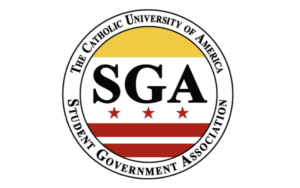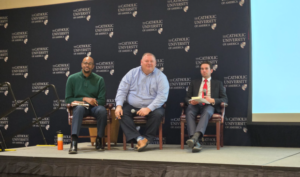D.C. Statehood Movement: Unruffled by Coronavirus And Approaching Potential Milestone Amid Protests

Courtesy of CNN.com
By Eva Lynch
While much of the country remains in a pandemic-induced lockdown, District of Columbia residents are experiencing some rare normalcy from a pre-coronavirus world, as the next milestone in the continued momentum toward gaining statehood for D.C. has been achieved.
The movement, supported by the overwhelming majority of D.C. residents and Democratic politicians, recently regained strength when Congress held the first hearing on the issue in 25 years last September. The results of that hearing were a stark reminder of the red tape, in the form of a Republican-majority Senate, that the bill has to cut through in order to become law.
The partisan nature of this issue is one of emphatic and unwavering Democratic support, and equally strong and steadfast Republican hesitation. The Republican argument stems from Constitutional guidelines defining the purpose and provincial status of the District. The Founding Fathers noted and documented the need for a provincial area of which the function and responsibilities would be different from states’ in order to assure that no state could wield disproportionate power over the federal government because of proximity. D.C. was built specifically for this purpose shortly after the ratification of the Constitution. Were D.C. to become a state, the Federal Triangle would rely on D.C. services, such as for utilities and snowplowing.
Essentially, this argument deems granting statehood for the District unconstitutional.
Democrats argue that denying D.C. residents representation in Congress yet continuing to demand and utilize their tax money represents the unfair notion of “Taxation without Representation” of which the Constitution was created in combat. The current bill, entitled Washington, D.C., Admissions Act (H.R. 51), proposes a more limited Federal Triangle and would trim the seat of the federal government to a two-mile radius including Capitol Hill, the White House, and the Supreme Court. The remaining land would become its own state to be called New Columbia.
On Friday, the House voted to pass the bill and grant D.C. statehood. This distinguishes the first time since the District’s establishment in 1801 that either chamber of Congress has passed such a bill, as tweeted by D.C.’s nonvoting representative Delegate Eleanor Holmes Norton, the bill’s original author and proponent. Despite one previous failed visit to the floor, the bill gained enough Democratic cosponsors to pass through the House. Not one Republican representative voted in favor of H.R. 51. On the Senate floor, the bill will meet significant pushback in Republican senators, including Senate Majority Leader Mitch McConnell (R-Ky.), who has already stated his staunch opposition to the idea of granting statehood for D.C.
President Donald Trump, who may be required to act on the bill should it reach his desk at any point throughout his presidential tenure, has also voiced strong animosity towards the proposition of statehood.
“So we can have two more Democratic—Democrat senators and five more congressmen? No, thank you. That’ll never happen,” Trump said in an interview with the New York Post, also saying that granting statehood for the District would be “very, very stupid.”
Trump has yet to comment on the recent development.
Among others equally as contentious, this issue could spur a battle of strategy with the upcoming election, in which the Democrats take the process slowly in order to get the bill onto the desk of the next president, depending on the outcome. If the bill does pass through the Senate, Republicans may then strategize to push the bill forward quickly to ensure that Trump is there to veto.
The significance of this issue for the historically black population of D.C. is made even more so by the recent rejuvenation of the Black Lives Matter movement. House Speaker Nancy Pelosi and House Majority Leader Steny Hoyer (D-Md.) are championing the long-awaited progress of the bill as a victory for the residents of D.C., and black residents in particular, saying the bill signals, to all Americans, the government’s support for real structural change amidst the current power of the movement.
“This is not just an issue of local governance and fairness, it is a major civil rights issue as well,” Hoyer said. “This was an appropriate time to bring a bill forward to show respect for the citizens of the District of Columbia of whatever color, but also to show respect to a city that has a very large African American population.”
Following the protests in D.C., Mayor Muriel Bowser renamed a two-block section of Downtown D.C. “Black Lives Matter Plaza,” where the asphalt is emblazoned with 35-foot yellow capital letters echoing the street signs. In her statements regarding the protests in D.C., Bowser highlighted the connection to D.C. statehood efforts, saying that specifically the deployment of the national guard as a means to contain the protests necessitated statehood. Though the District was not the only city to which Trump deployed the national guard, it is the only one of which the governing body does not have the same options available to react and adequately warn and clear protestors, simply because of D.C.’s provincial status.
While the bill to grant D.C. statehood hails almost unanimous support from Democrats and District residents, the likelihood that the bill will pass through the Senate and Republicans’ parallel unanimity is slim. However, the issue is not as cut-and-dry as a Congressional vote makes it seem. Some of the Republicans’ pushback also stems from the misalignment of this case with the procedures delineated in the Constitution; because the Constitution necessitates the District, the procedurally correct way to pursue statehood is through seeking an amendment to the Constitution. Thus, experts say the most likely outcome of these preliminary votes is that they solidify the strength of the movement for statehood and prompt a discussion about a compromise in which the people of D.C. are granted equal voting rights and federal representation as state residents, yet the functions and procedures dictated by the Constitution are upheld.
Though the process is certain to be long, the issue’s long-fought emergence from the rut of local activism ensures it will not be disregarded.








